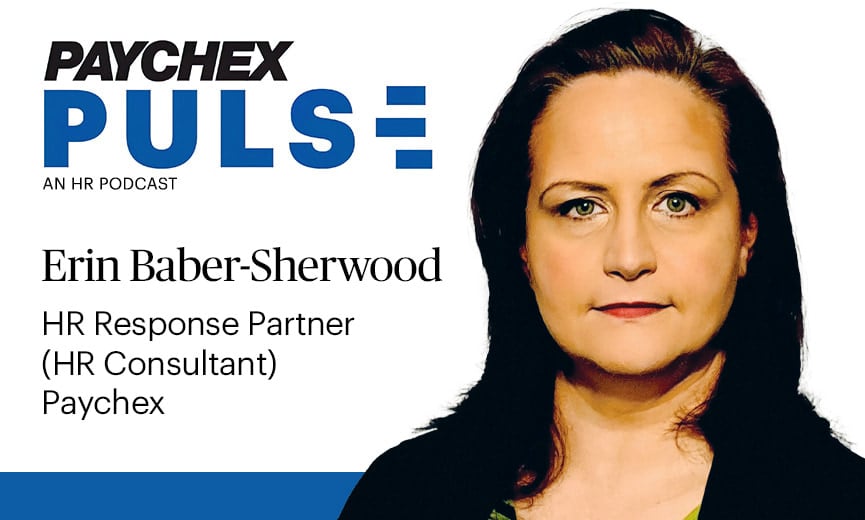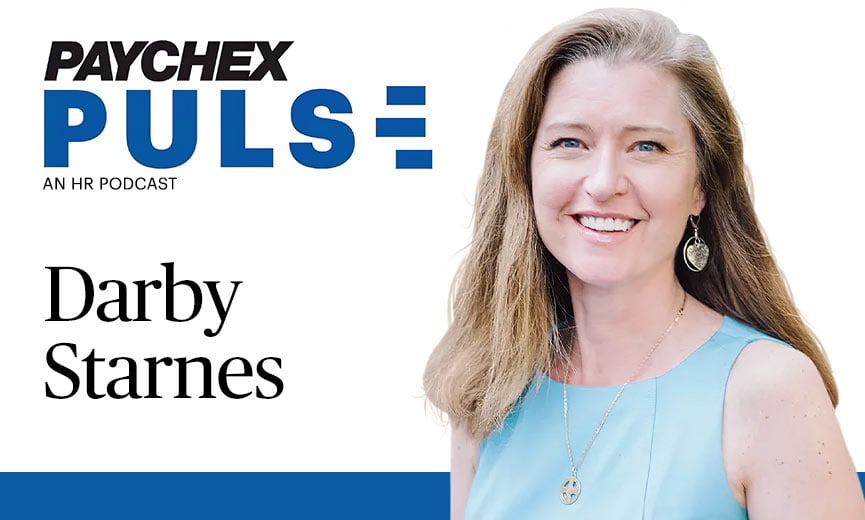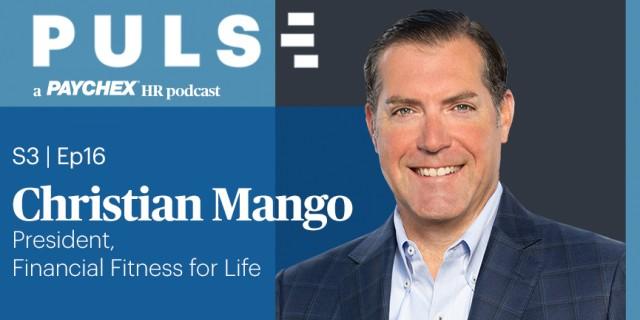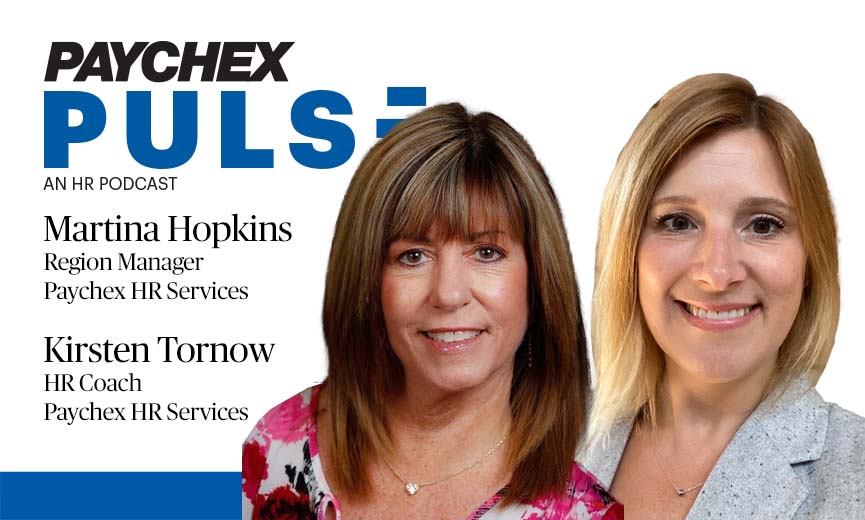Unveiling the HR Technology Trends You Need to Know: 2023 HR Tech Series - Part 4
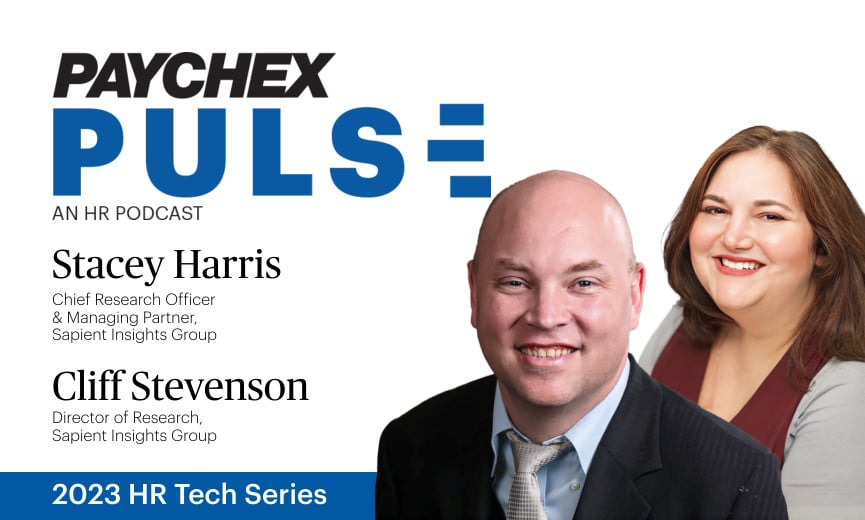
Podcast •

Resumen
As we conclude our series live from the floor of the 2023 HR Technology Conference, industry experts Stacey Harris and Cliff Stevenson from Sapient Insights Group, who are renowned for their work in HR systems and practices, join us to share the knowledge you need to navigate the evolving HR technology landscape. They also offer their insights on the latest market trends, the impact of AI on HR, and the value of a strategic approach to HR system integration. From the importance of continuous change management to the rise of data-driven decision making, learn how your organization can stay ahead of the curve.
Topics include:
00:00 – Welcome Stacey Harris and Cliff Stevenson
01:46 – Trends from HR Tech
03:48 – The benefits of HR technology for small businesses
06:53 – An overview of Sapient’s annual survey
08:50 – HR technology small businesses are investing in
11:01 – The importance of learning to use AI
12:20 – Important questions for small businesses
13:01 – Change management and implementing new technology
15:50 – What using AI looks like for HR pros
20:09 – How to access Sapient’s annual survey
21:53 – Wrap Up
Connect with Stacey:
> LinkedIn
> Twitter/X
Connect with Cliff:
> LinkedIn
> Twitter/X
Learn more from Sapient Insights Group, including accessing their annual survey, here.
Start preparing now for these 2024 HR technology trends.
Paychex doesn’t just have the HR technology you need, but the expert guidance that helps you optimize its benefits. Learn more.
Ver transcripción
Cliff Stevenson (00:00)
But we asked the question, what is your official policy at your organization for using AI and emerging technology intelligent tools? And you know, they could select from, oh, we go with our code of conduct, or we go with the local regulations, or they could say, we don't have one, don't know. And that was the majority of people. And the number might surprise you when it comes out, how many people said we just don't have anything.
Rob Parsons (00:29)
Welcome to season four of Paychex PULSE, an HR Podcast, where HR professionals can find great insights on today's top issues and be inspired to build and lead effective teams in a healthier workplace. Hi everyone. Rob Parsons here, live from the floor of HR Tech 2023. Welcome to the "Paychex Pulse" podcast. I'm super excited to be welcoming Stacey Harris and Cliff Stevenson from Sapient Insights Group to the show. Stacey is the Chief Research Officer at Sapient, where she oversees their industry research work, including the esteemed annual HR systems survey. In fact, she'll be presenting the findings of the 26th annual survey to close out the show this year. Cliff is the Director of Research at Sapient. Cliff's experience as a human capital research analyst is focused on talent acquisition, data and analytics, performance management, retention and attrition. He was previously an analyst with Brandon Hall Group and the Institute for Corporate Productivity. Stacey, Cliff, welcome to the podcast.
Cliff Stevenson (01:39)
Very happy to be here.
Stacey Harris (01:40)
Yeah, I'm very excited to be here again. It was a fun time we had last year, and we're having a good time this year, right?
Rob Parsons (01:44)
I hope so.
Stacey Harris (01:45)
Sí.
Rob Parsons (01:46)
So last year, the show was all about AI, it was all about employee experience. What trends now, you've been walking the floor, you've been going to the sessions. What trends are popping up this year? What are you seeing this year at HR Tech?
Stacey Harris (01:58)
Well, I want to be really honest. We don't get to go to sessions because we deliver them, and we meet with all the vendors. That's what an analyst does at these industry events. But we're happy to give you some of the trends because we have both from the report and from the vendors that we've been talking about, and we do talk to a lot of people around and about in the evenings and at the events. I mean, obviously the biggest trend is the artificial intelligence. Everyone's talking about it. Everybody has an opinion about it. The other things I think that we're seeing pretty clearly is that payroll's a big topic again.
Cliff Stevenson (02:27)
Absolutely.
Stacey Harris (02:28)
Yeah, and that we're probably going to be seeing more interest in discussions around the HR management system, particularly for mid-market and larger companies this year. And small companies, there's a lot of things that they're investing in. I mean, we definitely are seeing them going back to talking more about learning and performance management, which is something new, I think, for many small companies. Is there anything else you remember? I think there were rewards and recognition, wasn't there?
Cliff Stevenson (02:51)
Yeah, rewards and recognition is actually one of the areas where we saw SMBs and really businesses in general of all sizes starting to put more and more investment in. And it just isn't general, as you mentioned, the small market businesses. They're really seeing value in taking some of these things that used to be only for the larger enterprise companies, right, taking some of these looks at data and how they can integrate, and what sort of insights they can get from it, and using those database decision-making processes. And that used to be more of the purview of the larger companies, and now we see it, oh, everyone's doing it. Some of that is because of the AI we mentioned, right? We're making it easier. But it's also a more mature understanding of the HR practitioner.
Stacey Harris (03:36)
Yeah, we're definitely seeing the SMBs have more strategic conversations, which is kind of nice.
Rob Parsons (03:42)
There's a couple of things you said there I want to unpack.
Cliff Stevenson (03:45)
Oh, please.
Rob Parsons (03:46)
You know I'm going to be asking about payroll.
Stacey Harris (03:47)
Yes, we figured.
Rob Parsons (03:48)
But first, for the SMBs, is it just the accessibility to technology now that's democratizing some of this more strategic work? They can do more because they have more access?
Stacey Harris (04:02)
Yeah, I do think it is the accessibility. I think, you know, obviously that shift to the cloud, which made it more available for everyone. I think also too, SMBs have to compete at the same level for the same talent in a market that is really tight on talent. Even though we're in a bit of a down economy here in the U.S., globally that talent is still really hot, particularly those with skilled labor or frontline workers. Those are areas where we're really struggling to get the right people. Health care definitely is still struggling to get people with the skill sets they need. So, I think what you're finding is that for the SMBs to compete in this market, they have to really invest in more innovation, because they need to streamline their own processes. They can't have people sort of picking up the slack on that front, and they're definitely investing more in data to help them make decisions. And the talent management stuff, without a doubt, is where they have to sort of double down in some cases. And I think, Cliff, one of the things we had a conversation about was that the analytics area, we're seeing an increase in SMBs invest in analytics because they want that conversation about whether or not they're actually making the right decision, because you know, there's no opportunity to make too big of a mistake in this market, right? For SMBs, they've got once and done choices sometimes.
Cliff Stevenson (05:16)
Yeah, the larger businesses used to be the most complex, right, and there was a really clear delineation between the sort of things they had to deal with, with globally distributed workforces and all these different sources of data. But now that's true of SMBs too, especially in the sort of post-pandemic, more people working from home, more contingent workers than we've ever seen, as we see from our report. And so, they're being faced with the same challenges. And so, it's not just the technology, but they're now seeing more value in using the technology to meet the same challenges that their sort larger cousins, it used to be just them.
Stacey Harris (05:54)
But we should add that with that technology and with the need to do that comes some higher prices, and we're definitely seeing in our dataset that there's an increase in overall HR technology costs, depending on what size of organization you are, anywhere from about 5% to about 20% in some organizations. And so, it really is the investments are important, and we're seeing organizations feel they're paying off, but it is increasing in how much they're investing and per employee costs.
Cliff Stevenson (06:20)
Yeah. Some of that can be accounted for from the general inflation rate, as we talk about, but there's also more underlying technology that is, you know, nothing's for free, right? We want to be able to do these things, but that brings its own challenges too. But it's sort of a whole new world of this sort of flattening of everyone's sort of in the same boat and we're all going after the same talent, and we're all working together, and we all have some of the same regulations. We're starting to see some of the regulations affect small businesses that they never used to have to deal with.
Rob Parsons (06:53)
That's really interesting. I'm glad you mentioned the research because I'd love to get a preview. It's the 26th annual survey you're releasing. I know one of the areas you explored was the top HR technology investments. You know, you mentioned we're spending more on it, but what are the areas we're investing in?
Stacey Harris (07:10)
Yeah, so for those who might not know us, Sapient Insights Group runs this very longstanding, one of the deepest and broadest research efforts in the HR systems market, as well as the HR practices market. It's called The Annual HR Systems Survey, and many of your customers and people out there, so thank you for everyone who takes the survey. It's a big, big important process. We had over 5,000 people hit the survey this year, and we had over, how many people when we actually went to clean the data, Cliff?
Cliff Stevenson (07:37)
Well, it was 2,310, two thousand three hundred and ten organizations, so if people come in from different organizations, they get combined in. And that allows us to see what is the actual market saying? So, when we see how they're rating and the sort of challenges they're facing, we know that that's a true sense of the market, because our dataset is so large and we are allowed to be so strict on what data is allowed in, that we can really get a judgment for what's happening out there. So, you know, thank you for mentioning 26 years.
Stacey Harris (08:10)
I did not do it all 26 years. I'd have been five at that point. No, I've been doing it for about 10 years. Before us there was a great analyst, Lexi Martin, who was doing it. So now I'm passing the reins over to Cliff, and he's getting a chance to do some deep dives in there, right?
Cliff Stevenson (08:24)
Yeah, and it's fascinating because as big as the report is, it'll be 200 pages this year, there's so much that isn't in there, right? We take qualitative comments, and that allows us to sort of understand what people are saying, literally what they're saying about the challenges they're facing, and what's working and what isn't, down to the most granular level. But also allowing us to see the sort of broader topics and movements that are happening out there.
Stacey Harris (08:50)
Yeah, and some of the investments, I think we did mention already, particularly for the SMB market, we're definitely going to be seeing more investment in learning. Recruiting is still one of the top areas, performance management, rewards recognition, and then there's, I think, analytics there at the sort of bottom of that list of things that are their top five new investments. Now, when we've looked at things that they're going to be investing in from a replacement perspective, that's where we're seeing the highest replacement levels in the payroll solutions. So, a lot of organizations are looking at is my current payroll solution meeting my needs, and can I reduce some cost by going to a payroll system that might have more things with it, instead of trying to piecemeal all these different elements together. One of the things that we found this year is that on average, organizations at an SMB level have about 13 different modules, which means those are things they've implemented, they haven't used, that people have to manage and maintain and update, and they have to figure out how they're using them and the processes. That's 13 for organizations of 500 employees or more. When you go up to the larger size, you're looking on average at 28, I think was the highest, right? Those are really big numbers to manage that many different datasets, that many different processes, even if they come from the same system. But a lot of times, organizations are looking to consolidate some of that. The other thing that we're seeing from an investment perspective is that there is a conversation happening about sort of how organizations are spending their time when it comes to the technology. So, what that means is, you know, the service delivery model around it. So, what kind of, do I need a chat bot? Do I need an HR generalist? What are the HR resources I need to sort of make sure the technology can't do it all by itself, and it can't feed itself as far as information. You know, if I'm going to be having a new chat bot who's going around and picking out the most important information in my handbook, somebody still has to make sure that's the right data in the handbook, right? So, we're seeing investment in resources that have that higher level of technology awareness. And I think those are sort of the big ones. Anything in the emerging tech that I missed, Cliff, they're investing in?
Cliff Stevenson (10:51)
No, I think that's really the overarching theme across all of these, whether it's anything from blockchain to RPA and any of these uses. You know, we might as well talk about AI because it's required by law this year at HR Tech.
Rob Parsons (11:07)
It is, yes, it is.
Cliff Stevenson (11:08)
Is that, you know, we are trying to find ways, you know, it's not about job replacement, it's not the robot that's going to take your job, but the person who understands how to use AI and how to use the robot will take your job. So, you have to start to learn how to best use that. Where does the human element come in? Where does that oversight happen? And that's what we all need to do to educate, both from the analyst side and from the technology provider side, and I think it's really important because you know, the other one, and I don't want to give this one away, so I won't give the exact numbers, but we asked a question, what is your official policy at your organization for using AI and emerging technology intelligent tools? And you know, they could select from, oh we go with our code of conduct, or we go with the local regulations, or they could say we don't have one, don't know, and that was the majority of people. And the number might surprise you when it comes out, how many people said we just don't have anything. So, you know, this is an exciting time. There's new technology, but I think we all also need to think about how exactly are we using it, and are we ready? And I think we are, but we need to think about what are we trying to solve? What's the business problem we're trying to solve? Never lose sight of that.
Stacey Harris (12:20)
Yes, definitely. And never lose sight that whenever you're sharing data, you want to know where it goes. So, for all my SMB friends out there, sometimes they'll have these free tools, there's really cool tools that I can kind of log in and put all my information. And even if you're not doing it as an HR, someone in your company might be. That data goes somewhere, and someone has access to it, and someone then learns off it. So, we always tell people to ask the really hard questions about where does that data sit, how's that data being gated off, where am I getting that benchmarking data from if it's actually giving me some benchmarks? Are those companies that look like me? Are those companies that have been checked for bias and for concerns around regulations? Those are important questions for even the smallest company to ask.
Rob Parsons (13:01)
It gets so complicated, and I really love that you touched on the surround for the technology. I feel like so many people invest in the technology, but they don't invest in the change management, in the leadership practices, in the whole idea of adopting that technology and really getting the most out of it. Is that part of the value equation that you were looking at too?
Cliff Stevenson (13:21)
That's exactly it. Go ahead.
Stacey Harris (13:23)
Oh, okay, so we're like, who wants to tell this story? Now, one of the things is that because we do this research year over year over year, we get data that we can kind of go back to, and we see data, we run the same analysis on different datasets, which is the best way to do research. If you ever sort of look at how laboratories do research and you look at how big universities do research, the number one thing is to make sure you're not always sort of surveying the same people unless you're sort of trying to look at a longitudinal thing over a group of people. You really want to be able to get the same outcome when you're looking at different datasets. And so, because of the way we do our research, and we have more than 70% of our dataset is new every year, what we're able to do is actually check in and see what is actually moving the needle when you want to basically get better business outcomes, because we ask a series of business outcomes and HR outcomes and talent outcomes every year. And the three things that without doubt come up every year are I have an HR system strategy, even for the smallest organizations, I have an integration strategy, remember all those 20 modules and systems, right. And then the third one is I invest in change management, in continuous change management. And the continuous change management, which means I think about it as a journey or an on-going process, not a project, that really has double digit outcomes at the highest level of impact that you can have in the organization. And what's really sad, and so I'll just say in our keynote this week, I am going to call out some people because we're seeing not as much investment in this area as we need. And I think there's a challenge because it's a challenge to the vendors, it's a challenge to the consulting firm, to the industry analysts like us. I think we all have to stop saying change management's good but do whatever you want to do. We have to say if you're going to get the outcomes, you have to do change management. And I think everybody has to stand behind that conversation, because it's the first thing that gets cut out of the budgets, especially for small businesses.
Rob Parsons (15:17)
Oh, I bet, I bet. Any thoughts to add on that one, Cliff?
Cliff Stevenson (15:21)
No, I always think of one of our other founders and co-workers, Susan Richards, who handles a lot of our change management research, and she's had this happen numerous times, where someone says, okay, we'd like to have you come in and help us with our change management processes after we buy the technology. She's like, no, no, no, no, no, no. Somewhere right now, her eyes are rolling back in her head.
Stacey Harris (15:45)
It's an important thing for every organization to be thinking about, yeah.
Rob Parsons (15:50)
So now, as required by law, I do have to ask the AI question.
Cliff Stevenson (15:53)
Let's do it.
Rob Parsons (15:54)
We're actually running some live polling in the booth this year.
Stacey Harris (15:56)
All right.
Rob Parsons (15:57)
It's something I like, and we've been talking a lot about analytics, data-driven decision making, and how AI's stepping in there. The concern is, or the question is, is that going to remove that human element, that gut, that experience, that intuition? Maybe the data doesn't tell me everything I need to know, or will it? So, what is your take on that?
Cliff Stevenson (16:22)
I think what the data can do when used correctly is it can point out something that stands out that you wouldn't have noticed, right? I used to run payroll as an HR person, right, and I had made a mistake of an extra zero. I'm just looking at a huge spreadsheet, and some people received that extra zero and some didn't, but it's a tool that is really good, that can run these big datasets, and it can learn, and it can say, oh, that is an anomaly. You never give that person that much money. Now, it's not going to change it. All it's going to do is tell me. And when used correctly, that is how AI and these sort of machine learning and these algorithms can help us by telling us, hey, look at this, and then you decide what to do, and then you have that conversation. And there's a lot of use cases where it requires a human. We don't want machines making the decisions for us, we want them helping us make better decisions.
Stacey Harris (17:20)
And I think, you know, one of the things we're all going to have to get used to is that the generative AI is not the first time we've talked about AI instead of businesses, right? Like it's really actually been since 1960 that we've been really talking about AIs inside of these systems. But what the difference is is that generative AI has come along, and unlike some of the original neural networks, which were doing a lot of good pattern matching, like Cliff was talking about, generative AI does a lot better at communication and understanding our language. So, it's just more of a verbal kind of AI versus more of a pattern-matching AI. And what that really gives is the opportunity that it can go and source out and understand all of the different things that it sees and come back with some more interesting conversations that feel like they're right to us. And with really good parameters and really good questions that you ask it, you'll get the right things back. But a lot of people don't know, it's kind of, if anybody was in recruiting back in the day, there was this Boolean search role that we used to all have. Remember those, right? And it's very similar to that today, is that if you don't know how to ask the right question, you're not going to get back the right information. And one of the things that we think is really important when you think about AI is that it is going to be valuable. And it's going to be this point in time is going to be the change, the same kind of change we saw when cloud technology came in place, when new iPhones hit the market, right? This is going to be a point we're going to look back and go, oh, that was a moment, a year that we should be paying attention to. But it's not because machines are going to take over the world or they're going to do our job for us. But it's because we started to look at different types of artificial intelligence, because previously it was always just pattern matching. Now we've got pattern matching in communications, and there will be others that will follow. And inside of your system, the most important thing to realize is that the human beings now are going to be asked to make more judgments than they've ever had to make. So, your conversation about that gut instinct, that judgment, you're not even given a lot of data that the artificial intelligence is putting forward. Do you want this zero? Are these supposed to be here? Is this information right? Somebody's had opportunity to maybe leave. Are you aware of this? Your judgment is going to be the most important thing on your job. So we're really moving from a knowledge-based society, where information was the most important thing, and now the systems can get the information. We don't have to memorize all of it, we don't have to know where it's all at, that's what we've all been doing for so many years, to more of an intuition-based society, one where your judgment and your creativity of all that information that you get is going to be the most valuable thing. It's going to take us a few years to get there, but it's a lot of things that we're hearing in the market, and that, I think, is going to change the dynamics of just work itself, right?
Rob Parsons (19:57)
I love that. I love that there's room for wisdom. That makes me very happy. You know, this was a great conversation. I really appreciate you both coming on the show. Where can our listeners dig into this 26th annual survey?
Stacey Harris (20:14)
Well, they can, so the first place is they should probably go to our website, it's SapientInsights.com, and that's where they can see the store where it's located. They can download it from our research store online. There's also an executive summary there, which will be a really great asset for them to be able to access some of the small findings, early findings that they want from the research. I would also recommend following both Cliff and I on LinkedIn, so reaching out to us, because they're going to see a lot of input and articles and things that we're going to be posting over the next couple of months about what's happening in that research. And if they're on any other social medias like Instagram or Twitter, @SapientInsights is probably the best way to get the updated information on all of it.
Cliff Stevenson (20:53)
Yeah, and if I could, because now that I'm handling a lot more of the survey, take the survey. Let your voice be heard. It will be out again in May. I realize it's a ways off, but it's a long survey, so start getting prepped now, and we'd love to hear from you, because that's how we really find out what's happening in the market.
Stacey Harris (21:10)
Yeah, and we should note, I mean, because with artificial intelligence comes the fact that we can't just give away a lot of free data these days.
Rob Parsons (21:18)
That's right.
Stacey Harris (21:19)
Because it comes out and people can use it. So what we are doing though is anyone who participates in the research every year gets the research for free. So that's probably, if you were looking and you're saying, boy, I really want that but it's not something that I have the ability to purchase right now, the best way to do it is to make sure, like Cliff said, to come in in May, make sure you take the survey, and you'll have access to it in October as soon as it comes out. And since we've been doing it for 26 years, I can promise you we're going to do it another 26 years. Cliff will be taking over at that point. I might be out sailing some point in time.
Cliff Stevenson (21:48)
Yeah, I'll be 31 at that point, just like you were before, yeah.
Rob Parsons (21:53)
Fantastic. Well, Stacey, Cliff, thank you once again for coming on the show.
Cliff Stevenson (21:57)
Thank you for having us.
Stacey Harris (21:58)
Yeah, definitely. We enjoyed the conversation.
Rob Parsons (21:59)
Love it. And thank you to our listeners as well. I really hope you enjoy this series live from the show floor at HR Tech 2023. As always, please stay happy and healthy. Be sure to subscribe to this and our "Paychex Thrive" business podcast on your favorite podcast platform. Looking for more ways to keep your finger on the pulse of industry dynamics? Visit our resource center for the latest research, thought leadership and news at Paychex.com/worx. That's W-O-R-X. Thanks again for joining us. Until next time, please stay happy and healthy.
Announcer (22:38)
This podcast is property of Paychex Incorporated, 2023. All rights reserved.

 Apple Podcast
Apple Podcast Spotify
Spotify iHeartRadio
iHeartRadio